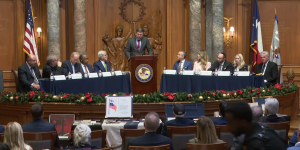Associate Attorney General Tom Perrelli Speaks
at Harvard VAWA Event
Cambridge, MA
United States
Good evening. My name is Tom Perrelli, and I am the Associate Attorney General of the United States. And more importantly, I am a Harvard alum, having graduated from the law school back many, many gray hairs ago. I am so happy to be able to come speak and engage with you tonight. I want to tell you a little bit about what I do at the Justice Department and why I am here, but the truth is that what I’m most interested in is opening this up and having a real dialogue around issues of intimate partner and sexual violence on campus.
As the Associate Attorney General, I am the third ranking official at the Department of Justice, and my responsibilities include overseeing our grant making programs for state, local and tribal law enforcement. That includes the Office on Violence Against Women, which administers critical funding to victim service providers and programs across the country.
This past September marked the 15 year anniversary of President Bill Clinton signing the Violence Against Women Act – or VAWA – into law. My visit here is part of the department’s year-long campaign to raise public awareness on issues around violence against women and to make sure that survivors everywhere know that they have a place – and a voice – in this administration. We are working to build toward a future where domestic abuse, sexual assault, stalking and teen dating violence are eradicated.
As part of the department’s campaign, we have held media events across the country, highlighting best practices and raising awareness around federal, state, local and tribal coalitions that include victim services communities, including campuses, to help put an end to these crimes of violence. So this month, we have taken our campaign to college campuses. I am one of eight department leaders who will visit 12 schools across the country in March to meet with students and faculty.
We know that when young people witness or are victims of violence, they pay the price for many years to come. We also know that campuses face unique challenges. We know that students who are victimized by other students often face additional challenges in a campus environment. For example, a victim of dating violence, domestic violence, or sexual assault may continue to live in danger if the perpetrator resides in the same dormitory or attends the same classes. On smaller campuses, a victim may wish to remain anonymous but may find this to be virtually impossible in such a small environment. Similarly, stalking victims may find it difficult to escape their tormentors, because the stalker may have a seemingly "legitimate" reason for remaining in contact with or in proximity to the victim, like studying in the library. The fear and anguish suffered by rape victims may continue if they attend the same classes or live in the same dormitory as the perpetrator. In other cases, a victim may be harassed by classmates or by a perpetrator’s. A victim may feel compelled to remain silent and not report what has happened. Even changing class schedules or living arrangements may not eliminate the threat of encountering the perpetrator on campus.
Violence against women and children is an issue I personally care deeply about, and it is one of the many areas where I believe that we are at a critical point to make a real and significant difference. That is why I have chosen to kick off the department’s tour at Harvard. Intimate partner and sexual violence can be found on college campuses across this nation – regardless of how much ivy is on your walls or how big your endowment. None of us are above the reality of this issue, and it is incumbent upon all of us to stand up and take responsibility.
Despite the VAWA anniversary, we at the department do not view this as a commemoration, but as a call to action. We want to use this year to recommit ourselves to ending violence against women. Our government and the department have a responsibility to speak out. This administration has committed itself to thinking outside the box – to bringing in new ideas, and new coalitions, to bring about change. It’s time to examine what we’ve done right, and more critically, what we’ve done wrong. Far too many communities in the United States are affected by this issue. We are committed to working with federal, state, local, tribal and campus partners to ensure that all communities are given the resources and support they need.
We at the Justice Department share a vision where men, women, boys, girls and communities can live in a world without the fear of violence. Our discussion today takes another step towards raising awareness. If we’re going to do this, we are going to have to do it together.
Thank you for taking yet another step in that commitment today.

 U.S. Department
of Justice
U.S. Department
of Justice

